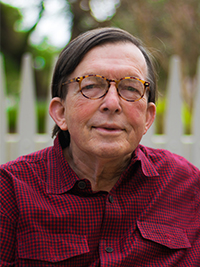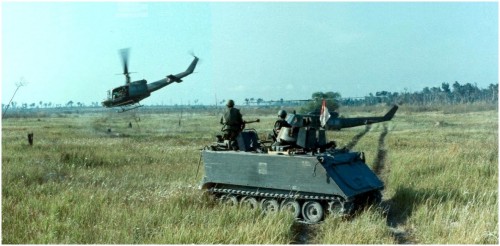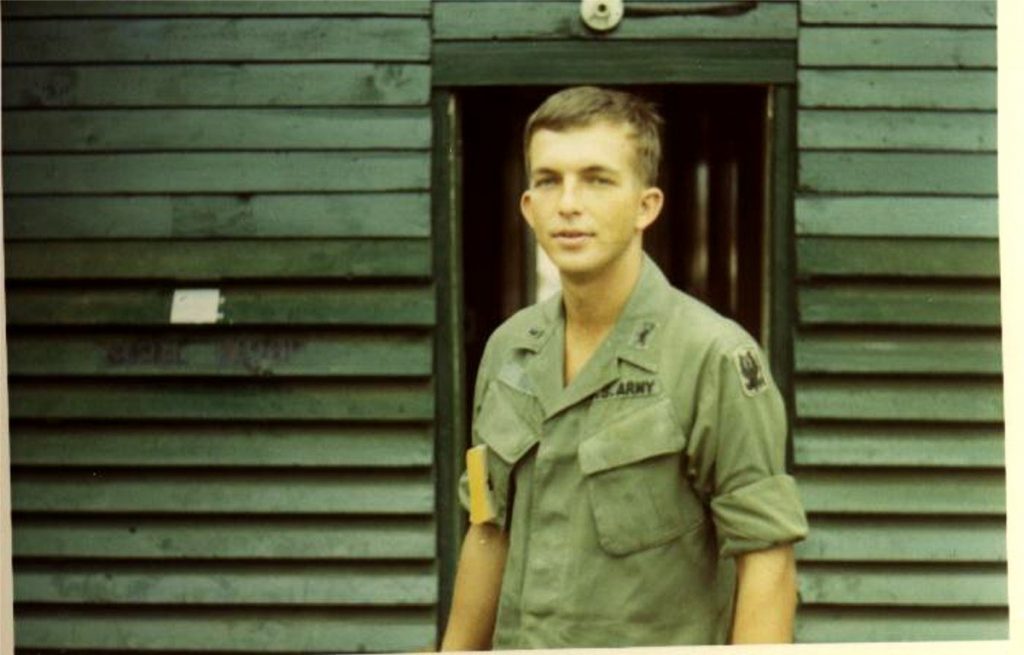
Before the War
Dr. Beidler attended Davidson College, in North Carolina, under the Woodrow Wilson Fellowship. During his time at Davidson he joined the ROTC program where he was trained as an Armored Cavalry Lieutenant. He joined ROTC as a means to join the military in an officer position rather than being drafted as an enlisted soldier. In his own words, ” [A] lot of people just felt, if I got to go, I’d rather go as a Lieutenant than a Private, so a lot of people took senior ROTC.” His draft number was called during his time as a student which meant that he was deferred until he finished school. Once he completed his undergraduate degree he reported to the recruiting station and he was sent to Vietnam. Dr. Beidler later found out that he would have been able to remain in school through his PhD, but this had not been properly communicated to him, resulting in him joining the war. Such communication was apparently common in the Army at this time.
“And so, the Army did not claim me right away, they did not… They said you, you go get your, you go get your masters degree, and what I didn’t realize, in those days, it’s like the Army, there was always somebody that doesn’t get the word. That I could have stayed for my PhD, which would have gotten me all the way through about 1972, 1973. And then I could have done my active duty teaching at West Point, which is what they wanted me to do. But I didn’t know that, so when I finished my Master’s Degree, I told them I was done. And they took me. They needed Lieutenants.”
Time In Vietnam
Upon arriving in Vietnam, Dr. Beidler was assigned to the 17th Armored Cavalry Regiment, Troop D: a part of the 199th Light Infantry Brigade.

M113 ACAV 
Dr. Beidler 
17th Cavalry
His experience arriving in Vietnam was not the most welcoming.
“That was actually your sort of first disconcerting moment because you would fly in on this civilian airplane, stewardesses and inflight meals and all that. And I still remember, the door opens, the plane door opens and we were still, most of us were still wearing khakis. We don’t get out jungle fatigues until we get to our unit. And I remember the heat just coming up my knees and up my hips and all that. So, we’re at this like landing area where we’re all supposed to go sit over on these benches. Well there’s right beside it there’s a whole other area with benches, and there are a bunch of other guys who are about to get on your plane, and they’re going home. They’re at the end of their tours. And they’re screaming things at you: “Noobie, you’re gonna die, you’re going home in a body bag,”. It’s not encouraging, but that’s how they did it. The plane would stay on the ground for about 15, 30 minutes. You can unload a bunch of, they call us FNGs: Fucking New Guys, a bunch of new guys would get off and just, you know, these guys who had done their tours would go home.”
After spending 6 months in Vietnam as a platoon leader, he was promoted to Executive Officer of his troop.
” And I was made the Executive Officer of the troop, which meant I was second in command. One of my jobs was if the commander got killed I had to take over, I had to go in there. But mainly I made sure the, I spent the second half flying in a lot of helicopters taking out supplies and gas, and ammunition and things. I’d hook up these sling loads to these big Chinook helicopters hovering right over my head, and they’d lift them out, but I basically lived out of my jeep while I was doing that. I would go to various fire bases. “
When asked about a defining moment of the War, Dr. Beidler had a story that once more brought to attention miscommunication in the military; similar to that which resulted in his joining the army in the first place.
“I was bringing in a load of machine gun barrels on a Huey, on one of the helicopters. And the other reason I was coming in was because I had gotten a message, an incorrect message, that Mike Doyle, my troop commander had been killed in that ambush, and part of the deal was if you were the Executive Officer, that’s one of your jobs is to take over if the commander is killed. You’re second in command. So, I flew in, and I looked, I hit, I flopped down on the ground, everybody said, “Get down, get down!” They’re shooting at the helicopter. I finally get up and run and here’s Mike. He’s big as life, he’s doing Mike. He was a big man, good man. But I was there, and I was not coming out, so I was there for the day. It’s still, I think of it as my moment of truth. I mean we’d sort of made up our minds around noontime that we were probably going to be overrun. They estimated that there were probably 750 NVA in this unit. This big long killing zone. And there were about 40, 45 of us. And what saved us of course was artillery and air power, and by evening they were gone. It was eerie.”
After the War
After the war, Dr. Beidler finished his schooling. Immediately after graduating with his PhD, he accepted a job at the University of Alabama, where he taught for 45 years until he retired in 2018 due to health reasons. Upon being asked about his reception home, he replied that more than anything people tried to ignore veterans and that the war ever happened.
“They wanted the war to end. There were activist people, and there were political people that really wanted the war to end. They had these big marches in Washington. I never knew anybody who got spit on. I never got called a baby killer. The more important thing was that you came home one by one by one, and nobody wanted to hear about it. So, you were just sentenced to silence. Nobody wanted to know that you were a soldier in Vietnam. They didn’t want to think about that, so you know you didn’t have much, you felt very isolated. I just went to graduate school. Back to graduate school in English. I had a Master’s in English before I went to Vietnam.”
Since returning from Vietnam, Dr. Beidler has written several books on the subject of the War. In them, he describes his own experiences, but also what he observed in others. The books cover many topics such as how race was perceived in the war, or what it was like being an officer in charge of a Troop. Something that came across in both my interactions with Dr. Beidler as well as his books, was that he wants to teach people from his experiences, so that we do not repeat the same mistakes. When asked about the recent and current hostilities in the Middle East, Dr. Beidler told me that we were just doing the same thing we did in Vietnam all over again. This is something that believe Dr. Beidler was trying to prevent when he told his story, as he seemed displeased about all of the fighting and the involvement of the United States in the Middle East.
Dr. Beidler dedicated 45 years to teaching and learning. He combined his experiences in Vietnam with his English Degree and Position in the University of Alabama in order to teach us about the Vietnam War, and the mistakes that were made there.
Many books have been written about the Vietnam War, Dr. Beidler’s being a few among thousands. I asked Dr. Beidler why he thought that this was such a popular topic, beyond even other wars, he told me that Vietnam was a turning point in American self perception. He speaks of how prior to Vietnam, the American public had this idea that they were always the good guys, but that Vietnam had changed how people looked at America’s involvement in other countries and wars.
” At the time, most of us felt, and that’s whether we were soldiers, veterans, or whether we were people who had stayed at home and demonstrated against the war, that we finally got our comeuppance. This idea that we were the redeemer nation. This idea that we were always the good guys. We thought that we had put that to rest. You know, we lost that war. We got out asses kicked. And the French had gotten their asses kicked before that. Like I remark in the book, the one thing we should have learned, if nothing else: that a 3000-year-old Asian culture, really, deep down inside doesn’t want to be a 200-year-old American democracy. We have this business of American exceptionalism, and “We can’t be militarily defeated,”. Well we can. And we have been, and we shouldn’t make wars like that. “
Interview Audio and Transcript
More Pictures
Suggested Further Reading
“Close Quarters” by Larry Heinneman
“Late Thoughts on an Old War” by Philip Beidler
“American Wars, American Peace: Notes from a Son of the Empire” by Philip Beidler.
American Literature and the Experience of Vietnam. by Philip Beidler
Re-writing America: Vietnam Authors in Their Generation.
by Philip Beidler
Scriptures for a Generation: What We Were Reading in the ’60s.
by Philip Beidler
“Mobility, Shock, and Firepower: The Emergence of the U.S. Army’s Armor Branch, 1917-1945” by Robert Cameron